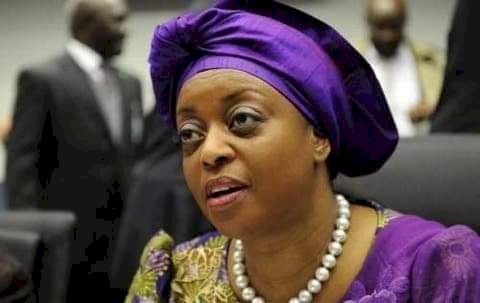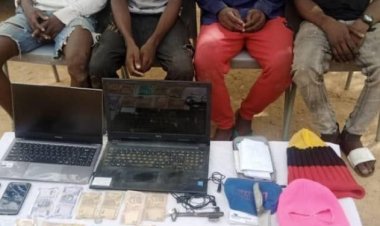Court Declines To Order INTERPOL To Arrest Ex-Petroleum Minister, Diezani

The Abuja Division of the Federal High Court, on Wednesday, refused an application by the Economic and Financial Crimes Commission, EFCC, for an arrest warrant to be issued with an order directing the INTERPOL to immediately arrest the former Minister of Petroleum Resources, Diezani Alison-Madueke, in the United Kingdom.
EFCC said its investigations revealed that the ex-Minister who is facing several money laundering allegations, has remained in her hideout in UK and refused to return to the country to enter her plea to charges against her.
At the resumed proceedings in one of the cases against her, counsel to the anti-graft agency, Mr. Farouk Abdullah, noted that the court had on July 24, summoned the erstwhile Petroleum Minister to appear for her arraignment.
Abdullah said the agency complied with directive of the court for the summon to be conspicuously published on EFCC’s website and in one national daily.
He said the Commission had upon fulfilling the Court’s order, filed an affidavit of compliance on October 8.
The prosecution counsel, however, noted that the ex-Minister spurned the summon by her failure to appear before the court on Wednesday to enter her plea to the money laundering charge against her.
He, therefore, pleaded the court to not only issue a warrant of arrest, but to further direct the INTERPOL to arrest her in the UK.
“My lord, this honourable court issued a summon for the defendant to appear today but the defendant has failed to appear.
“Giving the aforesaid fact, I apply that a warrant of arrest be issued against the defendant pursuant to Section 83(1b) of the ACJA 2015.
“We urge the court, in making the order, to direct all law enforcement agencies and the INTERPOL to arrest the defendant anywhere she is sighted and be brought before the court to answer to the allegation made against her before this honourable court”, EFCC’s lawyer added.
He said the Commission was equally liaising with the office of the Attorney-General of the Federation and Minister of Justice to get in touch with any country that may be hosting the Defendant so as to extradite her back to the country, in line with Extradition Act and General Convention of Nations.
Abdullah contended that since the summon did not achieve the desired result, there was need for a warrant of arrest to be issued against the Defendant.
However, trial Justice Ijeoma Ojukwu declined the request on the premise that EFCC must firstly file an affidavit evidence to prove that the earlier summon that was issued by the court failed.
Justice Ojukwu also noted that the EFCC informed the court that the office of the AGF was making effort to secure a warrant of arrest to enable the INTERPOL arrest the ex-Minister with a view to extraditing her to the country to answer to charges against her.
Consequently, the judge said the court would give the prosecution the room to put its house in order in the trial of the ex-Minister.
Noting that court orders are not made in vain, Justice Ojukwu held: “I have carefully perused the application of the prosecution. The earlier order of this court was made pursuant to Section 831 of Administration of Criminal Justice Act (ACJA).
“It is my view that the summon should have assisted in the extradition of the Defendant by the Office of the AGF.
“Today, the Defendant is not in court and no reason was giving. I am being informed that the defendant is believed to be in the United Kingdom (UK).
“The learned counsel also informed the court that the extradition process has failed as a result of the absence of the warrant of arrest.
“But if that is the case, learned counsel shall file an affidavit to that effect supported by evidence from the Office of the Attorney General of the Federation.
“I hereby give you time to put your house in order”.
The case was subsequently adjourned till December 3 for report and arraignment of the Defendant.
EFCC had told the court that investigations revealed that the former Petroleum Minister was not only deeply involved in money laundering, but equally played key roles in other financial crimes.
It decried that since the ex-Minister fled the country immediately she exited office, it has been difficult to get her back to respond to different criminal allegations against her.
In one of the documents it filed before the court, EFCC, said Diezani was among other things, wanted over alleged role she played in the award of Strategic Alliance Agreement (SAA) to; Septa Energy Limited, Atlantic Energy Drilling Concept Limited and Atlantic Energy Brass Development Limited by NNPC.
As well as to answer questions on her role in the chartering of private jets by the Nigerian National Petroleum Corporation, NNPC, and Ministry of Petroleum Resources and her role in the award of contracts by NNPC to Marine and Logistics Services Limited.
Besides, the agency said it is currently investigating the nature of business relationships the former Minister had with some persons.
It listed some of Diezani’s alleged allies under investigation as Mr. Donald Amamgbo, Mr. lgho Sanomi, Mr. Afam Nwokedi, Chief lkpea Leemon, Miss Olatimbo Bukola Ayinde, Mr. Benedict Peters, Christopher Aire, Harcourt Adukeh, Julian Osula, Dauda Lawal, Nnamdi Okonkwo, Mr. Leno Laithan, Sahara Energy Group and Midwestern Oil Limited.
The EFCC said it wanted the ex-Minister to speak on several items, documents and jewelleries that were recovered from her house at No: 10 Chiluba Close off Jose Marti Street, Asokoro, Abuja, and some identified properties that are linked to her In Nigeria, UK, United States of America (USA), United Arab Emirate (UAE) and South Africa.
More so, the Commission told the court that it would also require Diezani to explain her role in financing the 2015 general elections, particularly the money that were warehoused at Fidelity Bank Plc in 2015, prior to the elections.
Vanguard News Nigeria


















































